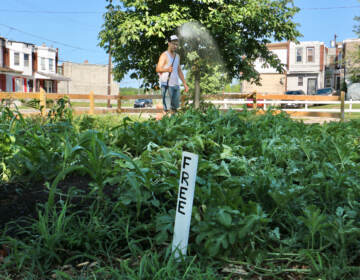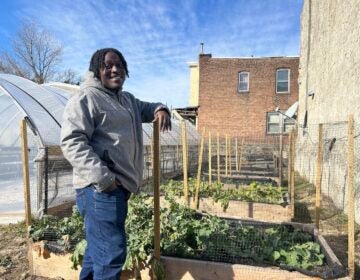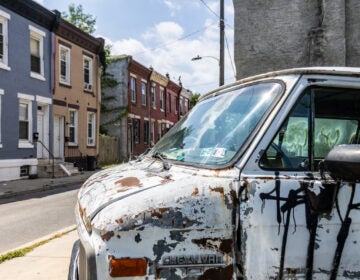‘We don’t have to be in jeopardy’: Philly gardeners cheer city deal to buy back liens
Community gardens on tax-delinquent land with privately held liens are considered particularly at risk for development.
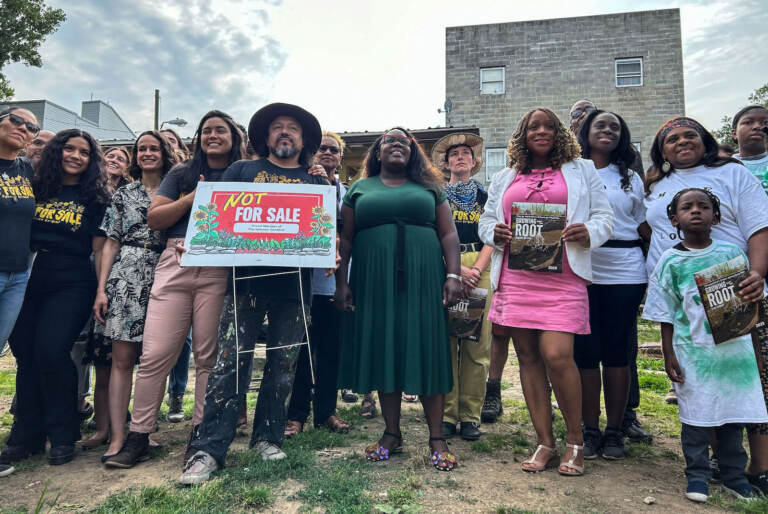
Members of City Council, gardeners, and advocates gathered to celebrate the lien buyback deal at Iglesias Gardens in North Philly Tuesday. (Sophia Schmidt/WHYY)
Some of Philadelphia’s community gardens will have a better chance at survival after the city struck a deal to gain control over whether and when the lots are sold at sheriff sale.
“This will be so fulfilling to finally relax and know that we don’t have to be in jeopardy of losing the garden,” said Elizabeth Waring, manager of the Holly Street Neighbors Community Garden in West Philadelphia, part of which is encumbered by privately held liens. “We’ve been in jeopardy for some time.”
Many community gardens in Philly are at risk of being lost to development because they’re on lots that aren’t owned by the gardeners. A Black- and brown-led coalition of growers and advocates and an urban design firm working on the city’s first urban agriculture plan estimated in 2020 that 1 in 3 active farms in Philly could be threatened by gentrification.
The vacant lots considered particularly at risk are those with liens held not by the city, but by a private company that could bring the lots to sheriff sale at any time in order to collect on their debt. The liens were sold by the city as part of a 1997 deal that generated a short-term influx of funds but did not fully pan out, leaving the city to default on bonds and leaving thousands of tax-delinquent lots to be sold off or suspended in limbo.
Under the deal announced Tuesday, the city agreed to buy back 91 of these liens — mainly in West, Southwest, and North Philly — for over $1.1 million.
“Community gardens aren’t luxuries, they have the potential to address serious needs like access to affordable healthy food, violence reduction, and community development,” said Mayor Jim Kenney in an emailed statement. “The City is committed to building thriving neighborhoods and enhancing the quality of life for all residents.”
Nearly half of the parcels covered by the deal are in Councilmember Jamie Gauthier’s West and Southwest Philly district.
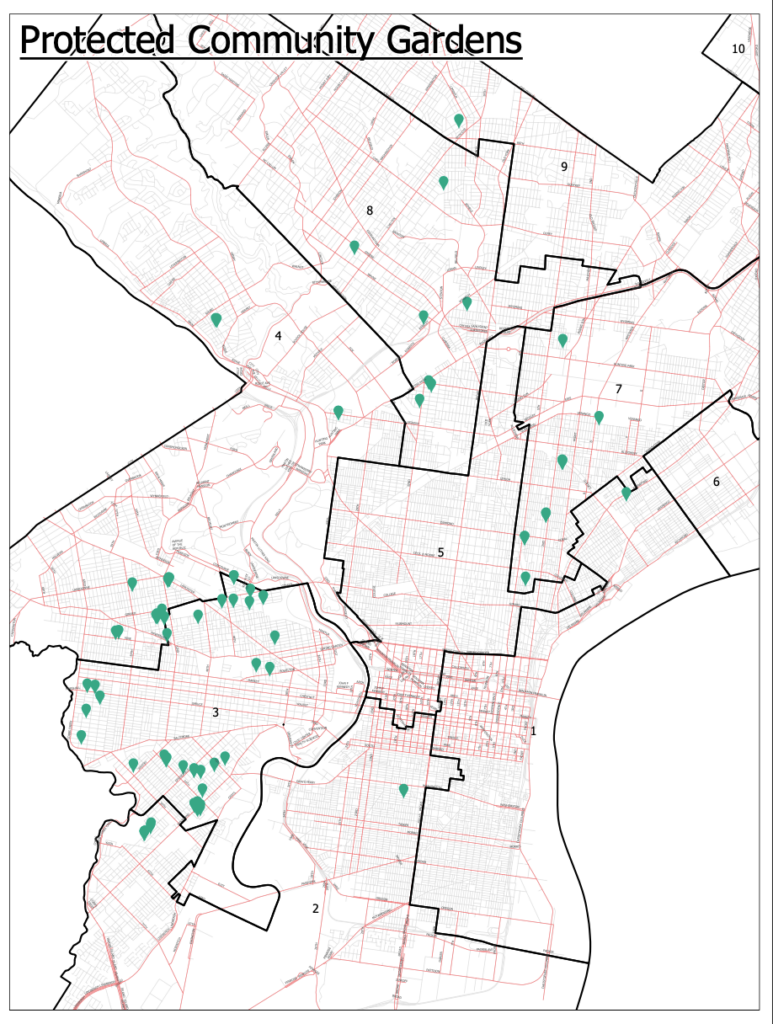
“It’s huge,” she said. “We are securing these vital community spaces that provide respite, that provide food, that provide places for neighbors to connect. … We’re protecting them [from] development and we’re putting them in the rightful ownership of the folks who have been stewarding and tending this land for so long.”
But advocates say the 91 garden parcels are just a fraction of the total number of vacant lots with privately held liens that Philadelphians currently steward or use as outdoor recreational spaces. Staff in Councilmember Kendra Brooks’ office, working with community organizers, estimated last year that 400 to 500 of these lots are currently used as side yards.
Last spring, Brooks proposed adding $10 million to the city budget in order to buy back the liens on hundreds of properties — both community gardens and side yards — to eventually transfer to the Philadelphia Land Bank.
“There are a lot of lot stewards that are involved in our campaign that aren’t in this deal,” said Ryan Gittler-Muñiz, a Kensington resident and a land security volunteer at César Andreu Iglesias Community Garden. “This is really exciting — like, our garden land is being secured and some of our side yard stewards are also winning in this deal — but others aren’t. … We want to include everyone and we definitely want more.”
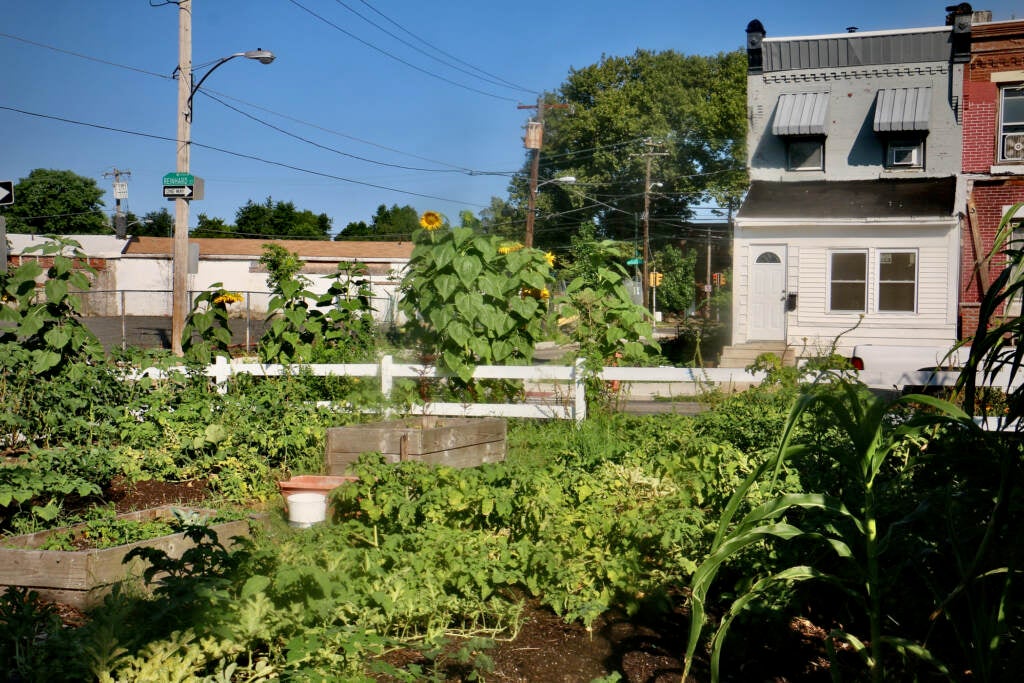
Diane Banks said the side yard next to her home in East Germantown has gone up for sheriff sale before, but it’s been too expensive for her to purchase. She continues to keep it clean, and said she wishes it could belong to her block.
“Let the kids in my block have some place to go,” she said.
This week’s deal does not mean gardeners automatically control the land. But staff in Councilmember Brooks’ office say they’re working with the city to develop a path to ownership, which could include the Philadelphia Land Bank acquiring the land, then transferring it to gardeners and community groups.
“Once we do that, the city will outright own those parcels and be able to transfer them to community ownership,” Gauthier said.
 WHYY is one of over 20 news organizations producing Broke in Philly, a collaborative reporting project on solutions to poverty and the city’s push towards economic justice. Follow us at @BrokeInPhilly.
WHYY is one of over 20 news organizations producing Broke in Philly, a collaborative reporting project on solutions to poverty and the city’s push towards economic justice. Follow us at @BrokeInPhilly.

Subscribe to PlanPhilly
WHYY is your source for fact-based, in-depth journalism and information. As a nonprofit organization, we rely on financial support from readers like you. Please give today.




